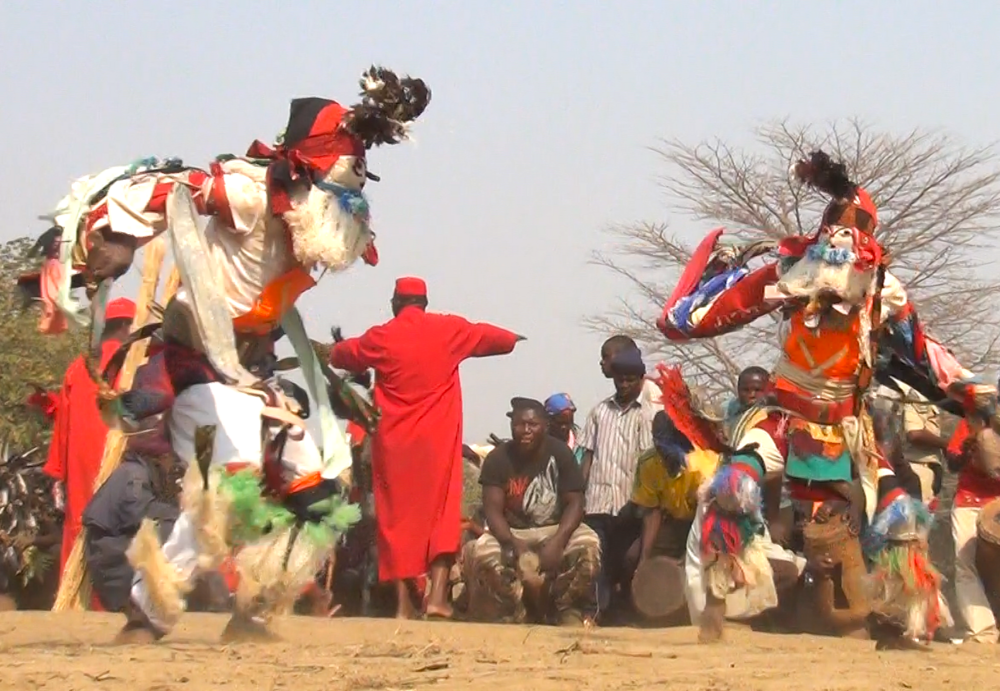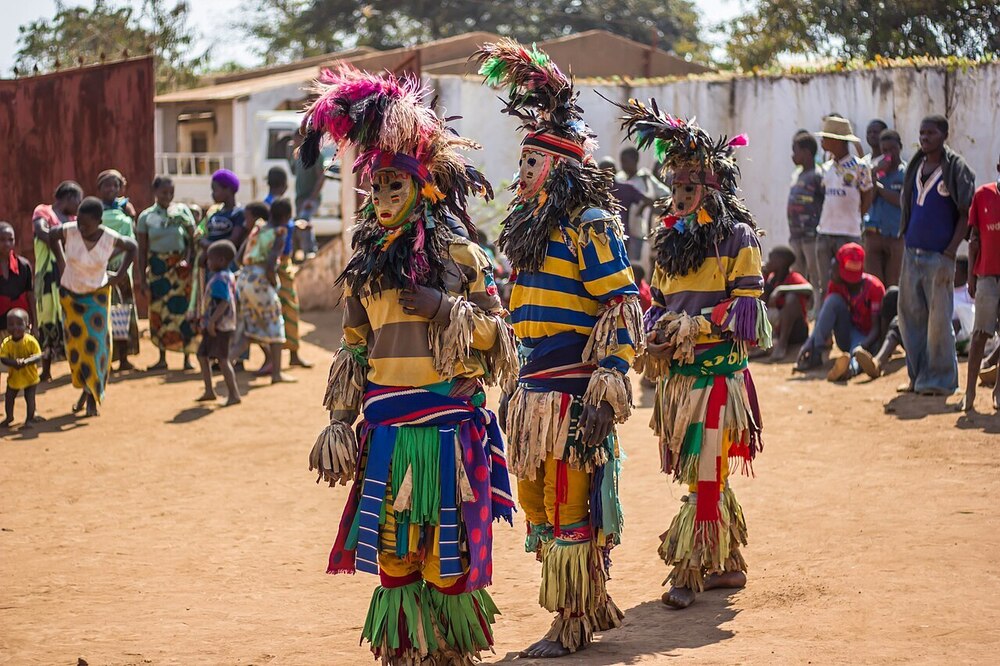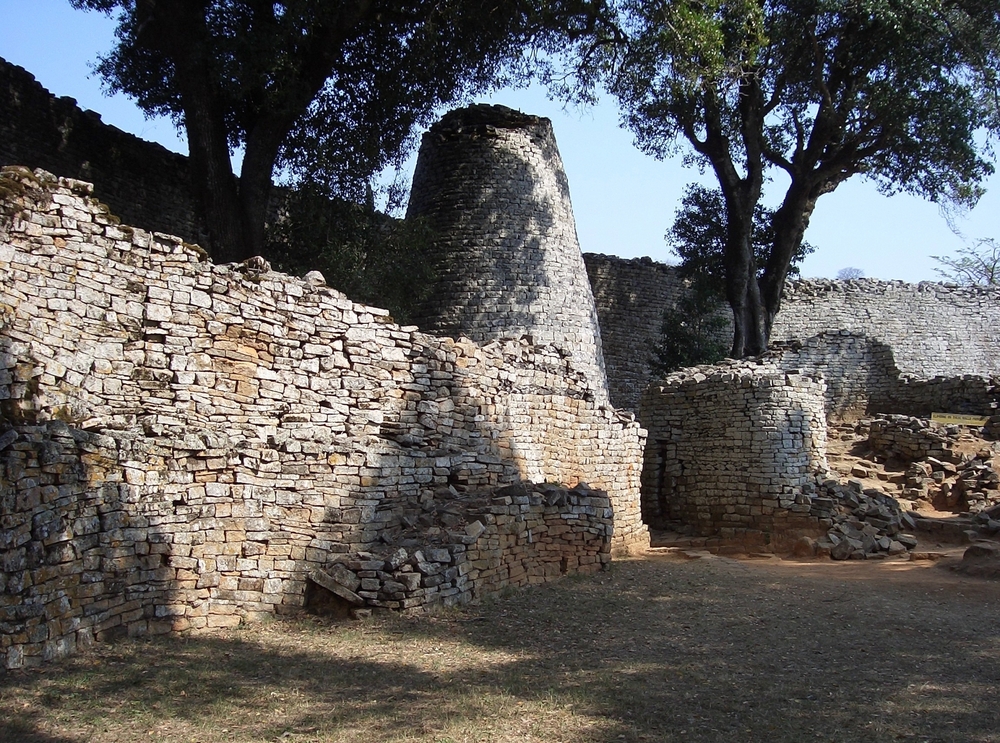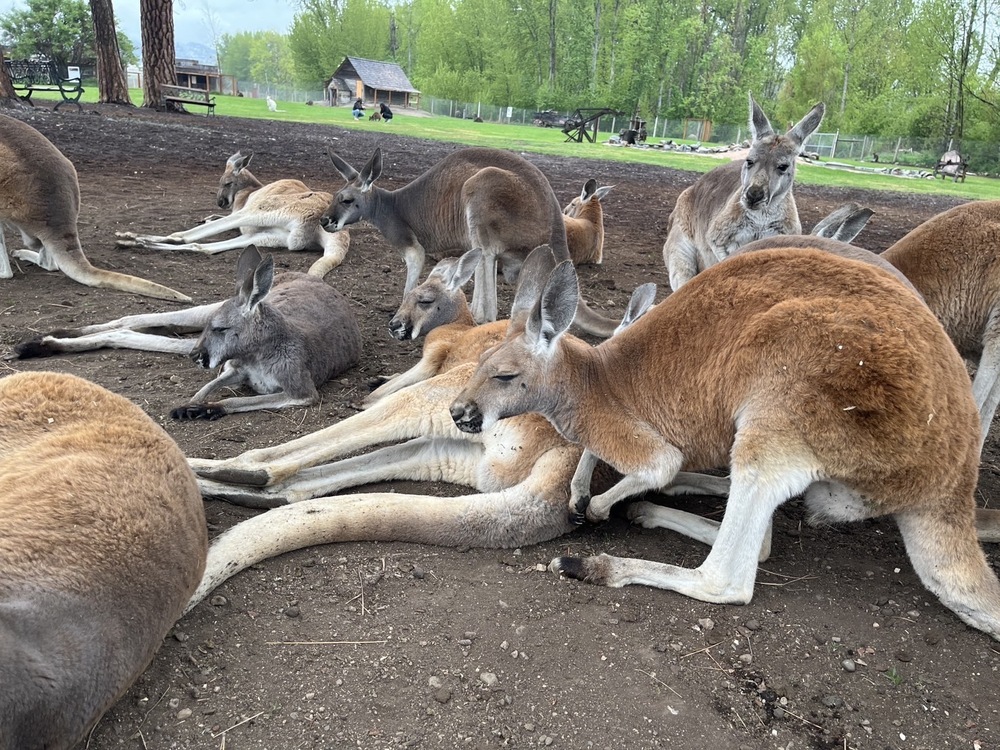
- Writer / 記事を書いた人
-

- Bridget
-
 Republic of Malawi(マラウイ共和国)
Republic of Malawi(マラウイ共和国)
Article
記事
Gule Wamkulu: The Great Malawian Dance
グレワムクル:マラウイの偉大な踊り
▼ 記事の音声を再生
<Let's learn!>
・A who …
・made from …
・remind(s) A of …
=====================================
In Malawi, we have a traditional dance called the Gule Wamkulu. This dance is performed by men who belong to a secret group called the Nyau of the Chewa tribe. When these men perform this dance, they wear colorful masks and costumes made from grass, cloth and feathers. The masks are made to look like spirits, animals or people.
Gule Wamkulu is performed at important events such as weddings, initiation ceremonies and funerals. Malawians love this dance. It is a way to teach values, respect our ancestors and entertain people.
The Gule Wamkulu dancers move in special ways to tell stories and send messages. While the dances may be scary, they are exciting and full of energy. This dance is a very important part of Malawian culture. It helps keep traditions alive and reminds people of their beliefs and history.
-------------------------------
【出典】
By Twiggalite - Own work, CC BY-SA 4.0, https://commons.wikimedia.org/w/index.php?curid=55008313
- 日本語訳を見る
マラウイには、グレワムクルと呼ばれる伝統的な踊りがあります。この踊りは、チェワ族のニャウと呼ばれる秘密結社に所属する男性たちによって演じられます。これらの男性がこの踊りを行う際、カラフルな仮面と、草、布、羽で作られた衣装を身につけます。その仮面は、霊、動物、または人に見えるように作られています。
グレワムクルは、結婚式、通過儀礼、葬式などの重要な行事で披露されます。マラウイの人々はこの踊りが大好きです。それは価値観を教え、祖先を敬い、人々を楽しませるための方法です。
グレワムクルの踊り手たちは、物語を語り、メッセージを送るために特別な動きをします。その踊りは怖いと感じるかもしれませんが、わくわくして、活気に満ちています。この踊りは、マラウイの文化において非常に重要な部分です。それは伝統を生き続けさせ、人々に彼らの信念と歴史を思い出させるのに役立ちます。

Key Points
キーポイント
Repeat each word(s) and example sentence(s) after your teacher/tutor.
先生の後に続いて、各フレーズ、単語、例文を言ってみましょう。自習の場合はスピーカーボタンを押して聞いてみましょう。
Key Phrases 重要表現
- A who …
-
…するA(人)
関係代名詞
-
This is a man who can speak seven languages.
こちらは7つの言語を話せる男性です。
- made from …
-
…から作られる
-
This meat is made from soybeans.
このお肉は大豆から作られています。
- remind(s) A of …
-
Aに…を思い出させる
-
That song reminds me of my childhood.
あの歌は私の子供時代を思い出させます。
Key Vocabulary 重要単語・熟語
- called
-
kɔːld
と呼ばれる
動詞(過去分詞)
- to give somebody/something a particular name
-
That planet is called Jupiter.
あの惑星は木星と呼ばれています。
- belong
-
bəlˈɔːŋ
所属する
動詞
- To be a member of a particular group, organization, or place
-
James belongs to the Los Angeles Book Club.
ジェームズはロサンゼルス・ブッククラブに所属しています。
- tribe
-
trάɪb
部族
名詞
- a group of people of the same ethnic group living together in an area
-
She has studied this Native American tribe for a long time.
彼女は長い間、このアメリカ先住民の部族について研究してきました。
- values
-
ˈvæljuz
価値観
名詞
- beliefs about how to live a moral life
-
Each person has different values.
それぞれの人は異なる価値観を持っています。
- belief
-
bəlíːf
信念
名詞
- an idea that you are certain is true
-
Our belief is that every child deserves a quality education.
我々の信念は、すべての子どもが質の高い教育を受けるに値するというものです。
Others その他
- traditional
-
trədíʃ(ə)nəl
伝統的な
形容詞
- following the customs or ways of behaving that have continued in a group of people for a long time
-
These are the traditional foods for Christmas.
これらはクリスマスの伝統的な食べ物です。
- grass
-
grˈæs
草、芝生
名詞
- a common plant with thin, green leaves that grows close to the ground
-
The grass is always greener on the other side.
隣の芝生はいつも青い。
- spirit
-
spírɪt
霊
名詞
- The nonphysical part of a person, believed in many religions to survive after death and to be able to exist separately from the body.
-
I don't believe in spirits.
私は霊の存在を信じていません。
- initiation
-
ɪnìʃiéɪʃən
通過儀礼、入門
名詞
- the process of officially introducing someone into a club or group, or of introducing a young person to adult life, often with a special ceremony
-
In many countries, marriage is an important initiation into adulthood.
多くの国において、結婚は大人への重要な通過儀礼です。
- funeral
-
fjúːn(ə)rəl
葬式
名詞
- a ceremony for honouring a person who has died, before the body is buried or burned
-
I attended the funeral of someone who helped me a lot in the past.
私は以前にたくさん助けてくれた方の葬儀に参列しました。
- while
-
(h)wάɪl
~だけれども
接続詞
- although
-
While I like sports, I'm not good at swimming.
私はスポーツが好きだが、泳ぐのは苦手です。
- alive
-
əlάɪv
生きている、生存している、活動的な
形容詞
- living, not dead
-
Japan keeps many ancient traditions alive.
日本には、数多くの古くからの伝統が今も息づいています。
Practice
練習
Fill in the blanks to complete the sentence.
空欄を埋めて文章を完成させましょう。
There are some students (___) have read this book in this class.
このクラスには、この本を読んだことがある生徒が何人かいます。
ヒント:A who …
- 回答を見る
There are some students (who) have read this book in this class.
The piece of art was (___) (___) plastic bottles.
その芸術作品は、ペットボトルから作られました。
ヒント:made from …
- 回答を見る
The piece of art was (made) (from) plastic bottles.
This music (___) me (___) the trip I went on with my family.
この音楽は、私が家族と行った旅行を思い出させます。
ヒント:remind(s) A of …
- 回答を見る
This music (reminds) me (of) the trip I went on with my family.
Article
記事(英文のみ)
Read the article aloud on your own or repeat each paragraph after your teacher/tutor.
記事を自分で読む、または先生に続いて段落毎に読んでみましょう。
Gule Wamkulu: The Great Malawian Dance
<Let's learn!>
・A who …
・made from …
・remind(s) A of …
=====================================
In Malawi, we have a traditional dance called the Gule Wamkulu. This dance is performed by men who belong to a secret group called the Nyau of the Chewa tribe. When these men perform this dance, they wear colorful masks and costumes made from grass, cloth and feathers. The masks are made to look like spirits, animals or people.
Gule Wamkulu is performed at important events such as weddings, initiation ceremonies and funerals. Malawians love this dance. It is a way to teach values, respect our ancestors and entertain people.
The Gule Wamkulu dancers move in special ways to tell stories and send messages. While the dances may be scary, they are exciting and full of energy. This dance is a very important part of Malawian culture. It helps keep traditions alive and reminds people of their beliefs and history.
-------------------------------
【出典】
By Twiggalite - Own work, CC BY-SA 4.0, https://commons.wikimedia.org/w/index.php?curid=55008313
Questions
質問
Answer the questions based on the article.
記事の内容から質問に回答しましょう。
What is the name of the Malawian dance?
マラウイの踊りの名前は何ですか?
ヒント:In Malawi, we have a traditional dance called …
- 回答を見る
It is (called) the Gule Wamkulu.
What do men wear when they perform the traditional dance?
男性たちは、その伝統的な踊りを踊る時、何を身につけますか?
ヒント:When these men perform this dance, they wear …
- 回答を見る
They wear colorful masks and costumes made from grass, cloth and feathers.
Why is this dance important in Malawian culture?
この踊りは、マラウイの文化においてなぜ重要なのでしょうか?
ヒント:This dance is a very important part of Malawian culture. It helps …
- 回答を見る
Because it helps keep traditions alive and reminds people of their beliefs and history.
Discussion
ディスカッション
Let’s have a discussion about the theme with your teacher/tutor or classmates.
先生やクラスメートとテーマについて話し合いましょう。
With your teacher/tutor 先生とのディスカッション
What do you think about this dance?
この踊りについて、あなたはどう思いますか?
I think it is ~.
Do you know any unique dances around the world?
If yes→ What is it?
世界で何かユニークな踊りがあるのを知っていますか?
(イエスの場合)それは何ですか?
Yes, I do./ No, I don't.
If yes→ I know ~.
Do you have any traditional dance festivals in your hometown?
If yes→ What is it?
あなたの地元で伝統的な踊りの行事はありますか?
(イエスの場合)それは何ですか?
Yes, I do./ No, I don't.
If yes→ It is~.
With your classmates クラスメートとのディスカッション
Do you want to see or join this dance? Why or why not?
あなたはこの踊りを見てみたいですか、あるいは参加してみたいですか?それはなぜですか?
Yes, I do./ No, I don't.
Because ~.
How do you feel when you dance?
あなたは踊るとどんな気分になりますか?
I feel ~./ It makes me feel ~.
What Japanese dance do you want to share with foreigners and why?
外国人に紹介したい日本の踊りは何ですか?そして、それはなぜですか?
I want to share ~. It is ~.







